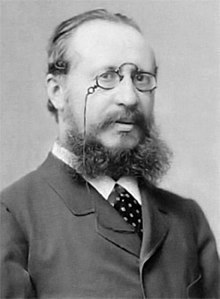Kálmán Széll
|
Noble Kálmán Széll de Duka et Szentgyörgyvölgy |
|
|---|---|
 |
|
| Prime Minister of the Kingdom of Hungary | |
|
In office 26 February 1899 – 27 June 1903 |
|
| Monarch | Francis Joseph I |
| Preceded by | Dezső Bánffy |
| Succeeded by | Károly Khuen-Héderváry |
| Personal details | |
| Born |
8 June 1843 Gasztony, Hungary |
| Died | 16 August 1915 (aged 72) Rátót, Hungary |
| Nationality | Hungarian |
| Spouse(s) | Ilona Vörösmarty |
| Children | Ilona |
Kálmán Széll de Duka et Szentgyörgyvölgy (8 June 1843 – 16 August 1915) was a Hungarian politician who served as Prime Minister of Hungary from 1899 to 1903.
He was born in the ancient Hungarian noble family Széll de Duka et Szentgyörgyvölgy, that originally hailed from the Vas county, in the western region of the Kingdom of Hungary. His father was József Széll (1801-1871), ispán-regent of the Vas county, and his mother was the noble lady Júlia Bertha de Felsőeőr (1817–1873). Among his illustrious Hungarian noble ancestors were his maternal grandfather, Ignác Bertha de Felsőeőr (1780-1847), vice-ispán of the Vas county, jurist, landowner, and his maternal great-grandfather, József Sümeghy de Lovász et Szentmargitha (1757–1832), royal counselor, jurist, landowner, and vice-ispán of the Zala county.
He studied in Pest and Vienna, and in 1867 became deputy for the district of Szentgotthárd. He very quickly won the reputation of being remarkably well informed on economic and financial questions. Széll was one of Ferenc Deák's confidants, whose ward, the daughter of the Hungarian poet Mihály Vörösmarty, he married.
In 1875, he was finance minister in the cabinet of Kálmán Tisza, and as such imposed on himself the task of restoring the shattered credit of Hungary. In 1878 he concluded with Austria the first economic "balancing" (German: Ausgleich). At that time, the single Austrian bank was changed, in conformity with this arrangement, into the dualistic Austro-Hungarian bank, and Széll consolidated the Hungarian Rentes, and nearly succeeded in balancing the state finances. As he feared that this balance would again be upset by the occupation of Bosnia and Herzegovina, he resigned from the cabinet, incurring thereby the displeasure of the crown. He still kept his seat in parliament, and as deputy constantly criticized the financial policy of the Tisza cabinet.
...
Wikipedia
